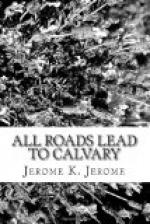“I’ll grant you all that, sir,” answered the young soldier who had first spoken. He had long, delicate hands and eager, restless eyes. “War does bring out heroism. So does pestilence and famine. Read Defoe’s account of the Plague of London. How men and women left their safe homes, to serve in the pest-houses, knowing that sooner or later they were doomed. Read of the mothers in India who die of slow starvation, never allowing a morsel of food to pass their lips so that they may save up their own small daily portion to add it to their children’s. Why don’t we pray to God not to withhold from us His precious medicine of pestilence and famine? So is shipwreck a fine school for courage. Look at the chance it gives the captain to set a fine example. And the engineers who stick to their post with the water pouring in upon them. We don’t reconcile ourselves to shipwrecks as a necessary school for sailors. We do our best to lessen them. So did persecution bring out heroism. It made saints and martyrs. Why have we done away with it? If this game of killing and being killed is the fine school for virtue it is made out to be, then all our efforts towards law and order have been a mistake. We never ought to have emerged from the jungle.”
He took a note-book from under his pillow and commenced to scribble.
An old-looking man spoke. He lay with his arms folded across his breast, addressing apparently the smoky rafters. He was a Russian, a teacher of languages in Paris at the outbreak of the war, and had joined the French Army.
“It is not only courage,” he said, “that War brings out. It brings out vile things too. Oh, I’m not thinking merely of the Boches. That’s the cant of every nation: that all the heroism is on one side and all the brutality on the other. Take men from anywhere and some of them will be devils. War gives them their opportunity, brings out the beast. Can you wonder at it? You teach a man to plunge a bayonet into the writhing flesh of a fellow human being, and twist it round and round and jamb it further in, while the blood is spurting from him like a fountain. What are you making of him but a beast? A man’s got to be a beast before he can bring himself to do it. I have seen things done by our own men in cold blood, the horror of which will haunt my memory until I die. But of course, we hush it up when it happens to be our own people.”
He ceased speaking. No one seemed inclined to break the silence.
They remained confused in her memory, these talks among the wounded men in the low, dimly lighted hut that had become her world. At times it was but two men speaking to one another in whispers, at others every creaking bed would be drawn into the argument.
One topic that never lost its interest was: Who made wars? Who hounded the people into them, and kept them there, tearing at one another’s throats? They never settled it.




